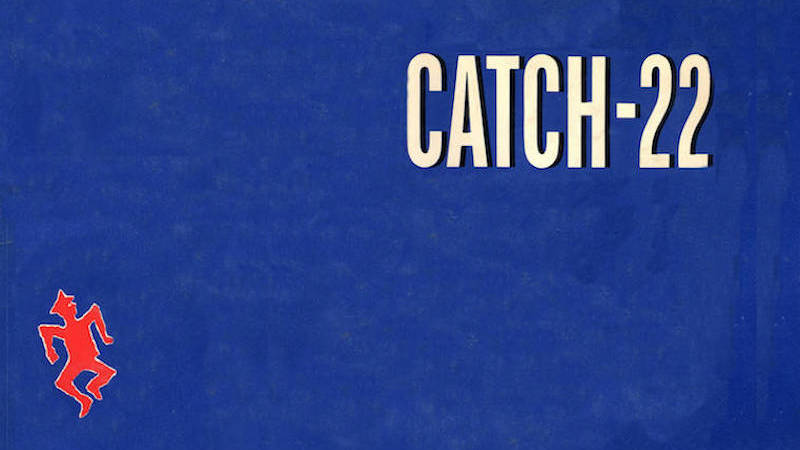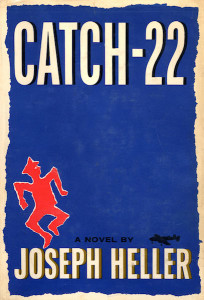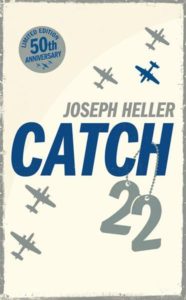
This week marks the 60th publication anniversary of Joseph Heller’s seminal satirical war novel, Catch-22.
A madcap, tragicomic tale of “malingering bombardier” antihero Captain John Yossarian and his compatriots in the fictional 256th US Army Air Squadron, Heller’s controversial (and oft-banned) debut novel became a publishing sensation in the early 1960s and has, in the decades since, spawned a feature film, a miniseries, a 50-character stage play, and, of course, a titular paradoxical concept. Oh, and it’s also sold somewhere in the region of 10 million copies.
Here’s a look back at one of the very first reviews of Catch-22, published ahead of the novel’s release in 1961, in which New York Times book critic Orville Prescott declares it to be “a dazzling performance that will probably outrage nearly as many readers as it delights.”
*

Just because you’re paranoid doesn’t mean they aren’t after you.
“Catch-22, by Joseph Heller, is not an entirely successful novel. It is not even a good novel. It is not even a good novel by conventional standards. But there can be no doubt that it is the strangest novel yet written about the United States Air Force in World War II. Wildly original, brilliantly comic, brutally gruesome, it is a dazzling performance that will probably outrage nearly as many readers as it delights. In any case, it is one of the most startling first novels of the year and it may make its author famous … Catch-22 is realistic in its powerful accounts of bombing missions with men screaming and dying and planes crashing. But most of Mr. Heller’s story rises above mere realism and soars into the stratosphere of satire, grotesque exaggeration, fantasy, farce and sheer lunacy. Those who are interested may be reminded of the Voltaire who wrote Candide and of the Kafka who wrote The Trial.

“Catch-22 is a funny book—vulgarly, bitterly, savagely funny. Its humor, I think, is essentially masculine. Few women are likely to enjoy it. And perhaps ‘enjoy’ is not quite the right word for anyone’s reaction to Mr Heller’s imaginative inventions. ‘Relish’ might be more accurate. One can relish his delirious dialogue and his ludicrous situations while recognizing that they reflect a basic range and disgust.
Joseph Heller’s key sentence is this: ‘Men went mad and were rewarded with medals.’ His story is a satirical denunciation of war and of mankind that glorifies war and wages war cruelly, stupidly, selfishly. So Mr. Heller satirizes among other matters: militarism, red tape, bureaucracy, nationalism, patriotism, discipline, ambition, loyalty, medicine, psychiatry, money, big business, high finance, sex, religion, mankind and God.

“Yossarian was brave once. But he had cracked up and couldn’t face any more bombing missions: ‘He had decided to live forever or die in the attempt, and his only mission each time he went up was to come down alive.’ Unfortunately, the colonel, who wanted to be a general, kept raising the number of compulsory missions. By the time they reached ninety everybody had cracked up and insanity prevailed.
More than a score of Yossarian’s friends and enemies play prominent parts in his story and each gets one or more chapters to himself. Each is a marvel of fear, cupidity, lust, ambition, dishonesty, stupidity or incompetence. The war effort—defeating Hitler, supporting the infantry—meant nothing to anybody. Blatant self-interest was the only motive on the strange Island of Pianosa … Catch-22 will not be forgotten by those who can take it.”
–Orville Prescott, The New York Times, October 23, 1961

